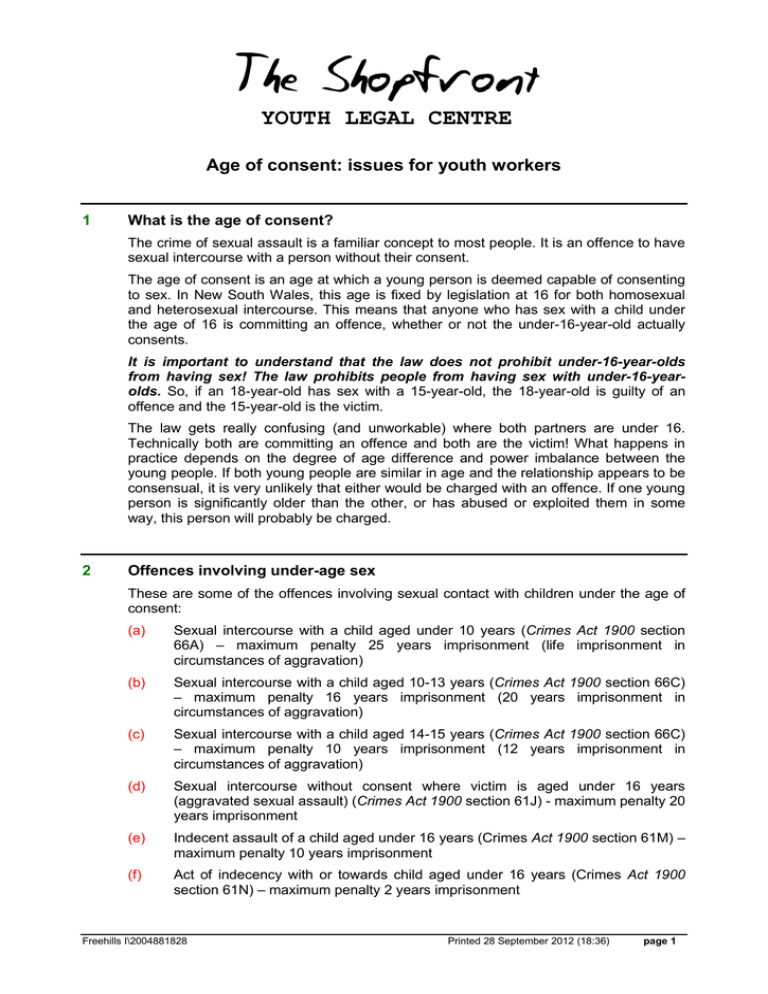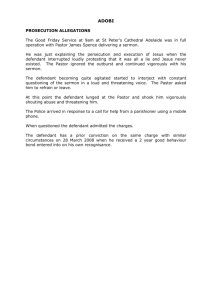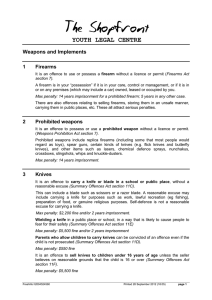
YOUTH LEGAL CENTRE
Age of consent: issues for youth workers
1
What is the age of consent?
The crime of sexual assault is a familiar concept to most people. It is an offence to have
sexual intercourse with a person without their consent.
The age of consent is an age at which a young person is deemed capable of consenting
to sex. In New South Wales, this age is fixed by legislation at 16 for both homosexual
and heterosexual intercourse. This means that anyone who has sex with a child under
the age of 16 is committing an offence, whether or not the under-16-year-old actually
consents.
It is important to understand that the law does not prohibit under-16-year-olds
from having sex! The law prohibits people from having sex with under-16-yearolds. So, if an 18-year-old has sex with a 15-year-old, the 18-year-old is guilty of an
offence and the 15-year-old is the victim.
The law gets really confusing (and unworkable) where both partners are under 16.
Technically both are committing an offence and both are the victim! What happens in
practice depends on the degree of age difference and power imbalance between the
young people. If both young people are similar in age and the relationship appears to be
consensual, it is very unlikely that either would be charged with an offence. If one young
person is significantly older than the other, or has abused or exploited them in some
way, this person will probably be charged.
2
Offences involving under-age sex
These are some of the offences involving sexual contact with children under the age of
consent:
(a)
Sexual intercourse with a child aged under 10 years (Crimes Act 1900 section
66A) – maximum penalty 25 years imprisonment (life imprisonment in
circumstances of aggravation)
(b)
Sexual intercourse with a child aged 10-13 years (Crimes Act 1900 section 66C)
– maximum penalty 16 years imprisonment (20 years imprisonment in
circumstances of aggravation)
(c)
Sexual intercourse with a child aged 14-15 years (Crimes Act 1900 section 66C)
– maximum penalty 10 years imprisonment (12 years imprisonment in
circumstances of aggravation)
(d)
Sexual intercourse without consent where victim is aged under 16 years
(aggravated sexual assault) (Crimes Act 1900 section 61J) - maximum penalty 20
years imprisonment
(e)
Indecent assault of a child aged under 16 years (Crimes Act 1900 section 61M) –
maximum penalty 10 years imprisonment
(f)
Act of indecency with or towards child aged under 16 years (Crimes Act 1900
section 61N) – maximum penalty 2 years imprisonment
Freehills I\2004881828
Printed 28 September 2012 (18:36)
page 1
Age of Consent: Issues for Youth Workers
(g)
Aggravated act of indecency with or towards child aged under 16 years (Crimes
Act 1900 section 61O) – maximum penalty 5 years imprisonment
(h)
Act of indecency with or towards child aged under 16 years, knowing it is being
filmed for purpose of child abuse material (Crimes Act 1900 section 61O) –
maximum penalty 10 years imprisonment
(i)
Act of indecency with or towards child aged under 10 years (Crimes Act 1900
section 61O) – maximum penalty 7 years imprisonment
Circumstances of aggravation include where the offender maliciously inflicts or threatens
to inflict actual bodily harm on the victim by means of an offensive weapon; where the
offender is in the company of other people; where the victim is under the authority of the
offender; where the victim has an intellectual or physical disability; or where the offender
took advantage of the victim being under the influence of drugs or alcohol.
3
Under-age sex – do you have to report it to Community Services?
Most people who work with children are mandatory reporters under the Children and
Young Persons (Care and Protection) Act 1998. Section 27 of the Act requires you to
make a report to Community Services if:
(a)
you are employed in (or are responsible for) the delivery of certain services (eg
health, education, accommodation, welfare, law enforcement) wholly or partly to
children; and
(b)
you have reasonable grounds to suspect that a child under 16 is (or a class of
children are) at risk of significant harm; and
(c)
those grounds arise during the course of your work.
According to section 23 of the Act, a child or young person is “at risk of significant harm”
when one or more of the following factors are present to a significant extent:
(a) the child or young person’s basic physical or psychological needs are not
being met or are at risk of not being met,
(b)the parents or other caregivers have not arranged and are unable or unwilling
to arrange for the child or the young person to receive necessary medical care,
(b1) in the case of a child or young person who is required to attend school, the
parents or caregivers have not arranged and are unable or unwilling to arrange
for the child or young person to receive education;
(c) the child or young person has been, or is at risk of being, physically or
sexually abused or ill-treated,
(d) the child or young person lives in a household where there have been
incidents of domestic violence, and as a consequence, the child or young person
is at risk of serious physical or psychological harm,
(e) a parent or other caregiver has behaved in such a way towards the child or
young person that the child or young person has suffered or is at risk of suffering
serious psychological harm,
(f) the child was the subject of a pre-natal report and the birth mother did not
engage successfully with support services to eliminate, or minimise to the lowest
level reasonably practical, the risk factors that gave rise to the report.
Technically, an under-16-year-old involved in sexual activity is a victim of an offence.
Some people think this means they are being sexually abused and are therefore “at risk
of significant harm” as defined by the act.
Freehills I\2004881828
Printed 28 September 2012 (18:36)
page 2
Age of Consent: Issues for Youth Workers
The more widely-held view (which we share) is that consensual under-age sex does not
necessarily amount to abuse or risk of significant harm within the meaning of the Act.
The 2006 edition of the NSW Inter-Agency Guidelines for Child Protection Intervention
(http://www.community.nsw.gov.au/for_agencies_that_work_with_us/child_protection_se
rvices/interagency_guidelines.html) makes it clear that under-age sexual activity does
not necessarily amount to abuse.
The following passage is from section 2.3.4 of the Guidelines, “Indicators of sexual
abuse”:
“Physical and psychological coercion of children is intrinsic to child sexual assault
and differentiates such assault from consensual peer sexual activity. Adults,
young people and children who perpetrate child sexual abuse exploit the
dependency and immaturity of children by misusing their power and encouraging
children to be secretive.”
The latest version of the guidelines is less clear. However, the section on “Sexual abuse
of child” starting on page 73 of the Mandatory Reporter Guide suggests that sexual
activity involving a child under 16 does not always amount to abuse:
http://www.community.nsw.gov.au/kts/guidelines/documents/mandatory_reporter_guide.
pdf.
4
Under-age sex – do I have to report it to the police?
Section 316 of the Crimes Act (NSW) says that if:
(a)
a serious offence has been committed; and
(b)
you know or believe it has been committed: and
(c)
you know or believe you have information which could assist in the apprehension
or conviction of the offender; and
(d)
you fail, without reasonable excuse, to bring this to the attention of the police or
other appropriate authority;
you are guilty of an offence and could face up to 2 years imprisonment (or 5 years if you
conceal the offence in return for some personal benefit).
A “serious indictable offence” is defined in section 4 of the Crimes Act as an offence
punishable by imprisonment for 5 years or more. This would include all of the sex
offences mentioned above.
The Act does not say what amounts to a “reasonable excuse”, but in our view it would
probably include the need to protect trust and confidentiality with your client.
Further, the consent of the Attorney-General is required before prosecuting someone
whose knowledge or information was obtained “in the course of practising or following a
profession, calling or vocation prescribed by regulations for the purpose of this section”.
The professions prescribed by the regulations are: legal practitioners, medical
practitioners, psychologists, nurses, social workers (including support workers for
victims of crime and counsellors treating people for emotional or psychological
conditions), members of the clergy of any church or religious denomination, and
researchers for professional or academic purposes.
Although “youth worker” is not on the list of professions, it is likely that a youth worker
would be treated in a similar way to a social worker or a counsellor.
It is therefore very unlikely that a youth worker or health worker would be charged
with this sort of offence.
Freehills I\2004881828
Printed 28 September 2012 (18:36)
page 3
Age of Consent: Issues for Youth Workers
Even if you are charged, this does not necessarily mean you will be found guilty. You
may succeed with an argument that client confidentiality gives you a reasonable excuse
for not disclosing.
Of course, if you are concerned about being charged with this offence, or are unsure
about whether to report a matter to the police, you should seek legal advice.
5
Providing sexual health services – are you aiding or encouraging a crime?
It is an offence to “aid, abet, counsel or procure” the commission of a crime. This means
assisting or encouraging someone to commit an offence.
Providing condoms, lube, dams or sexual health information does not mean you are
assisting or encouraging a young person to have sex, as long as the ultimate decision
rests with the young person.
Also bear in mind that a young person under 16 is not committing an offence by having
sex (unless the other partner is also under 16, in which case the older or more powerful
of the two would usually be considered the offender, and the other the victim).
Updated September 2012
The Shopfront Youth Legal Centre
356 Victoria Street
Darlinghurst NSW 2010
Tel: 02 9322 4808
Fax: 02 9331 3287
www.theshopfront.org
shopfront@theshopfront.org
The Shopfront Youth Legal Centre is a service provided by Herbert Smith Freehills, in association with
Mission Australia and The Salvation Army.
This document was last updated in September 2012 and to the best of our knowledge is an accurate
summary of the law in New South Wales at that time.
This document provides a summary only of the subject matter covered, without the assumption of a duty of
care. It should not be relied on as a substitute for legal or other professional advice.
This document may be photocopied and distributed, or forwarded by email, on the condition that the
document is reproduced in its entirety and no fee is charged for its distribution.
Freehills I\2004881828
Printed 28 September 2012 (18:36)
page 4





